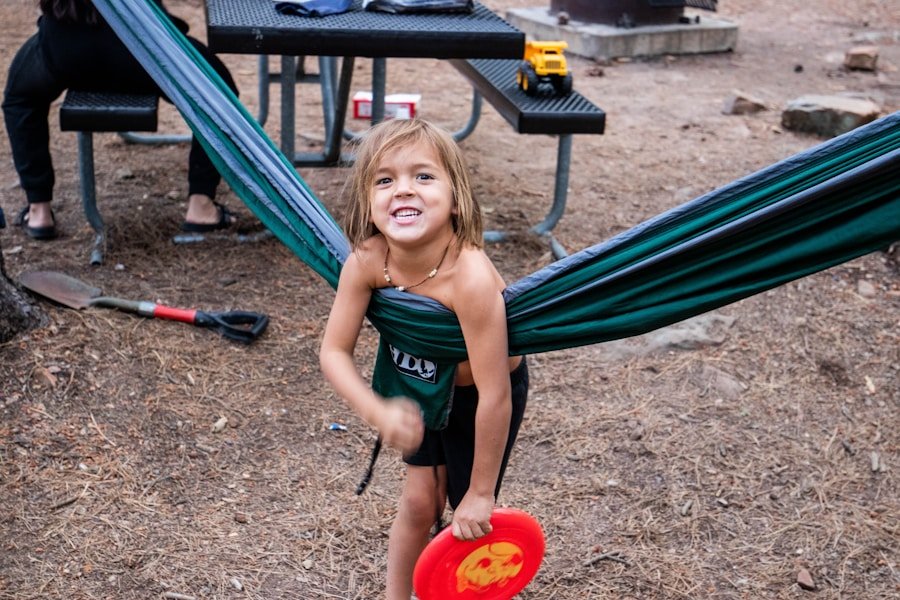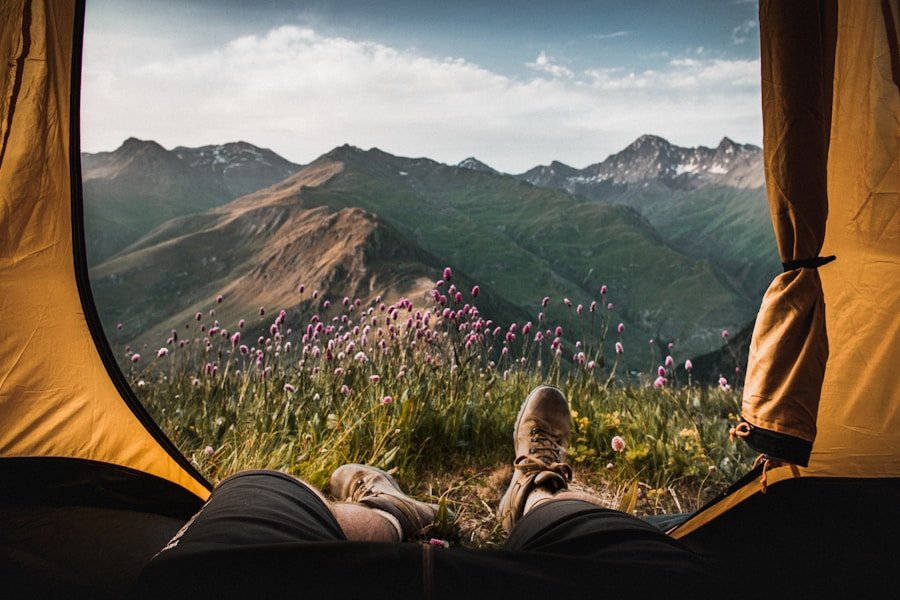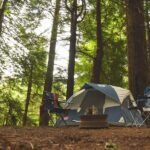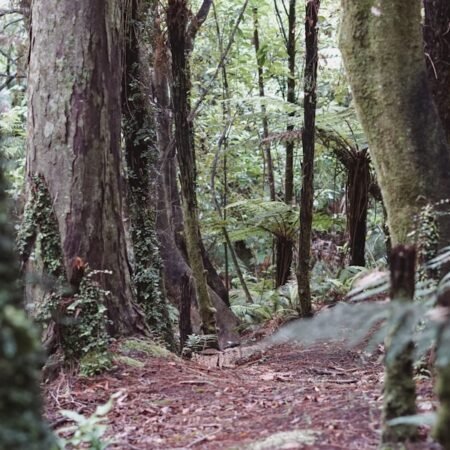When it comes to involving kids in the camping experience, one of the most important factors to consider is choosing the right campsite. It’s essential to find a location that is family-friendly and offers amenities that will make the experience enjoyable for kids. Look for a campsite that has easy access to clean water, restroom facilities, and possibly even a playground or designated play area for children.
Additionally, consider the proximity of the campsite to hiking trails, swimming areas, or other outdoor activities that kids will enjoy. It’s also important to choose a campsite that is safe and secure, with designated fire pits and a clear area for setting up tents. By taking the time to carefully select the right campsite, you can ensure that your kids will have a positive and enjoyable camping experience.
When it comes to choosing the right campsite, it’s also important to consider the natural surroundings and environment. Look for a campsite that is surrounded by beautiful scenery, such as mountains, forests, or lakes, as this can help to foster a love for the outdoors in children. Additionally, consider the wildlife that may be present in the area and take the opportunity to teach kids about the importance of respecting and appreciating nature.
By choosing a campsite that offers a rich natural environment, you can provide kids with the opportunity to learn about and connect with the world around them, making the camping experience both educational and enriching.
Key Takeaways
- Choose a campsite with kid-friendly amenities and activities
- Plan fun and engaging activities for kids such as scavenger hunts and nature crafts
- Teach kids basic camping skills like setting up a tent and building a campfire
- Involve kids in meal preparation by letting them help with simple tasks like washing vegetables or making s’mores
- Encourage kids to explore and appreciate nature by going on nature walks and identifying different plants and animals
Planning Fun Activities for Kids
Once you have chosen the right campsite, the next step in involving kids in the camping experience is planning fun activities that will keep them entertained and engaged. There are countless outdoor activities that are perfect for kids, such as hiking, fishing, swimming, and wildlife spotting. Consider planning a nature scavenger hunt or a guided nature walk to help kids learn about the plants and animals in the area.
Additionally, bring along outdoor games such as frisbee, soccer, or a kite to provide kids with opportunities for physical activity and fun. By planning a variety of activities that cater to different interests and energy levels, you can ensure that kids will have a memorable and enjoyable camping experience. In addition to outdoor activities, it’s also important to plan some downtime for kids to relax and unwind.
Consider bringing along books, art supplies, or board games to provide kids with opportunities for quiet and creative activities. Encourage kids to explore their surroundings and use their imagination to create their own adventures. By providing a balance of active and quiet activities, you can help kids to develop a deeper appreciation for nature and the outdoors while also allowing them to recharge and relax during the camping trip.
Teaching Basic Camping Skills
Another important aspect of involving kids in the camping experience is teaching them basic camping skills that will help them feel confident and capable in the outdoors. Take the time to show kids how to set up a tent, build a campfire, and cook over an open flame. Teach them about fire safety and how to properly extinguish a fire before leaving the campsite.
Additionally, show kids how to navigate using a map and compass, identify different types of plants and wildlife, and practice Leave No Trace principles to minimize their impact on the environment. By teaching kids these basic camping skills, you can empower them to take an active role in the camping experience and develop valuable outdoor skills that will serve them well in the future. In addition to teaching basic camping skills, it’s also important to involve kids in the planning and preparation process.
Allow them to help pack and organize gear, plan meals, and make decisions about activities and outings. Encourage kids to take on responsibilities such as gathering firewood, setting up their sleeping area, or helping with meal preparation. By involving kids in these tasks, you can help them develop a sense of independence and self-reliance while also fostering a sense of ownership and pride in the camping experience.
Involving Kids in Meal Preparation
| Activity | Description |
|---|---|
| Nature Scavenger Hunt | Create a list of items for kids to find in nature, such as pinecones, different types of leaves, or animal tracks. |
| Campfire Cooking | Show kids how to cook simple meals over a campfire, like hot dogs on a stick or s’mores. |
| Star Gazing | Teach kids about constellations and encourage them to look for stars and planets in the night sky. |
| Nighttime Storytelling | Gather around the campfire and take turns telling stories or sharing spooky tales. |
| Nature Crafts | Collect natural materials like rocks, sticks, and flowers to create art and crafts. |
Mealtime is an important part of the camping experience, and involving kids in meal preparation can be a fun and educational way to teach them about cooking and nutrition. Consider planning simple and kid-friendly meals that are easy to prepare over a campfire or portable stove. Allow kids to help with tasks such as washing and chopping vegetables, mixing ingredients, or assembling sandwiches or wraps.
Encourage them to get creative with their meals and try new foods that they may not have experienced before. By involving kids in meal preparation, you can help them develop valuable cooking skills while also fostering a sense of teamwork and cooperation within the family. In addition to meal preparation, consider planning special treats or snacks that kids can look forward to during the camping trip.
Bring along ingredients for s’mores or campfire popcorn, or pack some healthy snacks such as trail mix or fruit for on-the-go energy. Consider involving kids in the process of planning and packing snacks so that they can have a say in what they will be eating during the trip. By involving kids in meal preparation and snack planning, you can help them develop a greater appreciation for food and nutrition while also creating opportunities for bonding and shared experiences around the campfire.
Encouraging Nature Exploration
One of the most rewarding aspects of involving kids in the camping experience is encouraging them to explore and connect with nature. Take the time to go on nature walks or hikes with kids, pointing out interesting plants, animals, and natural features along the way. Consider bringing along field guides or nature identification books so that kids can learn about the flora and fauna in the area.
Encourage them to use their senses to observe and appreciate their surroundings, whether it’s listening for bird calls, feeling different types of tree bark, or smelling wildflowers. By encouraging nature exploration, you can help kids develop a deeper connection with the natural world while also fostering a sense of curiosity and wonder. In addition to nature walks, consider planning activities such as stargazing or wildlife spotting at different times of day.
Teach kids about constellations and astronomy, or bring along binoculars or a magnifying glass for close-up observations of insects or birds. Consider involving kids in citizen science projects such as bird counts or plant surveys to help them learn about conservation and environmental stewardship. By encouraging nature exploration in various forms, you can provide kids with opportunities for learning and discovery while also fostering a sense of respect and appreciation for the natural world.
Creating a Safe and Comfortable Sleeping Environment
A crucial aspect of involving kids in the camping experience is ensuring that they have a safe and comfortable sleeping environment. Take the time to set up sleeping arrangements that are suitable for kids’ needs and preferences. Consider bringing along sleeping bags or air mattresses that provide adequate insulation and cushioning for a good night’s sleep.
Additionally, consider bringing along extra blankets or pillows to provide added comfort and warmth during chilly nights. Take the time to set up tents in a safe and secure manner, ensuring that they are properly staked down and free from any potential hazards such as sharp objects or uneven ground. By creating a safe and comfortable sleeping environment, you can help kids feel secure and at ease during their time in the outdoors.
In addition to setting up sleeping arrangements, it’s also important to establish bedtime routines that help kids wind down and relax before going to sleep. Consider bringing along bedtime stories or quiet activities such as journaling or drawing to help kids transition from active playtime to restful sleep. Encourage kids to listen to nature sounds or observe the stars before bedtime as a way of connecting with their natural surroundings.
By creating a peaceful and calming bedtime routine, you can help kids feel more at ease in their sleeping environment while also fostering a sense of connection with nature.
Fostering a Love for the Outdoors
Ultimately, one of the most important goals of involving kids in the camping experience is fostering a love for the outdoors that will last a lifetime. Take the time to talk with kids about their experiences in nature and encourage them to share their thoughts and feelings about their time spent camping. Ask them about their favorite moments or discoveries during the trip, and listen attentively as they express their thoughts and emotions.
Consider planning future camping trips or outdoor adventures based on their interests and desires, allowing them to take an active role in shaping their outdoor experiences. By fostering a love for the outdoors in children, you can help them develop a deep appreciation for nature while also providing them with opportunities for growth, learning, and personal development. In addition to fostering a love for the outdoors, consider involving kids in environmental conservation efforts or outdoor education programs that allow them to learn more about nature and wildlife.
Encourage them to participate in local clean-up events or volunteer opportunities that promote environmental stewardship within their community. Consider enrolling them in outdoor education programs or nature camps that provide hands-on learning experiences in natural settings. By involving kids in these types of activities, you can help them develop a greater understanding of their role in protecting and preserving the natural world while also fostering a sense of responsibility and care for the environment.
In conclusion, involving kids in the camping experience is an enriching and rewarding way to help them develop valuable skills, foster a love for the outdoors, and create lasting memories with their families. By choosing the right campsite, planning fun activities, teaching basic camping skills, involving kids in meal preparation, encouraging nature exploration, creating a safe sleeping environment, and fostering a love for the outdoors, parents can provide children with meaningful experiences that will shape their relationship with nature for years to come. Through these efforts, parents can help children develop important life skills while also instilling a deep appreciation for the natural world around them.
FAQs
What are some ways to involve kids in the camping experience?
Some ways to involve kids in the camping experience include letting them help with setting up the campsite, involving them in meal preparation, and planning fun outdoor activities for them to participate in.
What are some kid-friendly camping activities?
Some kid-friendly camping activities include nature scavenger hunts, storytelling around the campfire, hiking on family-friendly trails, and stargazing at night.
How can I make camping meals more enjoyable for kids?
You can make camping meals more enjoyable for kids by involving them in the meal preparation process, letting them help with cooking over the campfire, and bringing along some of their favorite snacks and treats.
What safety precautions should I take when involving kids in the camping experience?
When involving kids in the camping experience, it’s important to prioritize safety by teaching them about wildlife safety, ensuring they have proper footwear for hiking, and supervising them around the campfire and any bodies of water.













